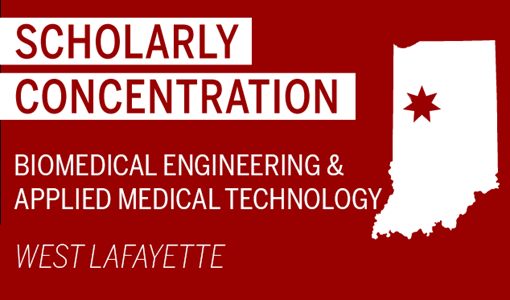In 2019, IU School of Medicine launched Scholarly Concentrations. To help students decide if a concentration topic is the right fit, concentration co-directors shared the inside scoop—from why they got involved in the concentration to how a specific topic can help students reach their goals.
Topic: Biomedical Engineering and Applied Medical Technology
Location: West Lafayette
Co-directors: Craig Goergen, PhD, Andrew Brightman, PhD, and Ray Munguia-Vazquez, MD, PhD
Introduce yourself. Who are you and why did you decide to become involved in this Scholarly Concentration topic?
Craig Goergen, PhD, Leslie A. Geddes Associate Professor of Biomedical Engineering (BME): I am the BME Director of Clinical Programs and am working to connect both our engineering students to clinicians and medical students/residents/fellows/clinicians to BME faculty. I decided to become involved as I am interested in connecting the Weldon School of BME here at Purdue with the IU School of Medicine at large.
Andrew Brightman, PhD, Associate Professor of Engineering Practice, and Assistant Head for Academic Affairs, Weldon School of Biomedical Engineering: In my previous research, I was part of a team that studied tissue engineering of scaffolds for human tissue replacement. The technology was licensed by a med tech company and has translated into a wide range of medical products in clinical use. Since then, I have worked as a consultant for the medical device industry and I have developed and facilitate in partnership with experts from medical device industry, a three-course series in regulatory affairs and regulatory science for medical devices. I have developed a novel course in ethical design, development, and deployment of medical technologies. I have an interest in preparing future clinicians to partner more effectively in the development and translation of medical technologies to improve the practice of medicine. I believe that the interactions our SC students will have with engineers and clinicians who are collaboratively innovating new medical technologies will be both inspiring and essential to the program.
Ray Munguia-Vazquez, MD, PhD, Clinical Assistant Professor of Otolaryngology, Head and Neck Surgery at IU School of Medicine-West Lafayette; and Speech Language and Hearing Sciences at Purdue University: I consider myself a clinician-scientist, someone that has received extensive clinical and research training. As part of my role as the assistant director for enrichment opportunities at West Lafayette, I am always looking for ways to enhance our medical education by connecting our students with other departments, offering them unique experiences to each and every one of them. My interest comes from the fact I have experienced, firsthand, the different types of collaborations that can exist between both schools and departments, and, because I understand the importance of developing well-trained, clinician-scientists for the benefit of the population.
What are you most excited about in regards to Scholarly Concentrations and/or your concentration topic?
Goergen: Interacting with medical students excited to learn more about the translational potential of engineering technology.
Brightman: Facilitating interactions of medical students with engineering teams in the process of innovating new medical technologies.
Munguia-Vazquez: To introduce our students the concept that they can combine medical care with new knowledge and technology, obtained throughout collaboration with BME, to improve the management and treatment of different disorders.
What are the two or three most important or interesting things students should know about this concentration?
It will connect medical students to a broad range of engineering faculty, staff, and students and help them understand the complexities of the process of translating novel medical technologies into the clinic. Medical students do not need an engineering background, however some experience with or awareness of medical or other technologies will be very useful. Development of medical technologies requires many activities, skills, and aptitudes beyond technical training, so there is an important role for people with clinical training as partners in the process.
How is this concentration beneficial to a student’s personal and professional goals?
Given that technological advancements continue to make an impact on clinical care, this concentration will prepare students with interests in R&D, clinical engineering, or partnerships with industry. Some students may have a hard time deciding which concentration to choose.
How can a student decide if this topic is the best fit for them?
Talk to other medical students who regularly interact with engineers about their interactions and what is important for successful partnerships. Spend a day shadowing someone who works in a medical technology industry or who participates in some aspect of medical technology development. Also look though the Engineering-Medicine website to see the many types of collaborative projects already underway to better understand what kinds of SC projects you might pursue.
What are the special resources and/or expertise on this concentration’s home campus? (i.e., what special resources or personnel make the campus uniquely suited for the concentration).
West Lafayette has a nationally ranked College of Engineering with strong technical expertise and facilities in engineering, computer science, physics, and similar disciplines. Over 60 biomedical engineering faculty with a broad range of expertise and multidisciplinary research areas have many collaborative projects for students to join. We numerous partnerships with local clinicians, clinical faculty members on campus, as well as with clinical researchers in the College of Veterinary Medicine. On the West Lafayette campus we have state-of-the-art medical imaging and clinical research facilities for human and animal pre-clinical studies.
